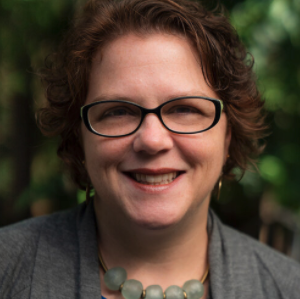
Melissa Browning is now among the ancestors, having died of cancer on April 8. Her family and friends will gather to celebrate her life and share our collective grief this Saturday. You can read more about her lasting contributions to the field of Christian Ethics on her website.
I met Melissa when I was a PhD student at Loyola University Chicago. I had completed coursework and was working on my dissertation proposal. We were introduced at a Theology Department gathering in Crown Center for the Humanities and I knew right away that she was someone I wanted to get to know better. We shared similar interests in feminist theology and global health. Our partners shared interests in films and travel. We talked about being from the South, missing Chick-fil-A, and learning how to drive in the snow. Melissa generously shared relevant books and articles with me. Her experiences living and working in East Africa had already shaped her understanding of structural violence and problematic notions of “missionary Christianity.” During her undergraduate years at Gardner-Webb, Melissa completed a minor in African Studies; she also completed Masters-level coursework at Maryknoll Institute of African Studies (Kenya) and earned an M.Div from Baylor University before beginning doctoral studies at Loyola. Melissa’s intellectual curiosity and passion for justice deeply influenced her friends, students, and research collaborators, and we all mourn together this heartbreaking loss to our circle of friends. Melissa made life more fun. She seemed to have endless hope–hope that grant applications would be successful, hope that people could change, hope in God’s power to heal broken bodies and broken hearts.
Melissa’s research methodology was shaped by her commitments to field research with vulnerable populations, including street children in Nairobi, communities displaced by post-election violence in Mai Mahiu, Kenya, female college students in Chicago, married women in Mwanza, Tanzania, and incarcerated women in Georgia. In all cases, Melissa modeled critical self-reflection regarding her own power and privilege as a white U.S. citizen. She sought to expand the safe spaces in which people could share their lived human experiences for the benefit of the church and academic community. I saw this in action when we participated together in a 2009 project, “Exploring Global Feminist Theologies in Postcolonial Space.” The ten scholars in the project collaborated in shared discussions of feminist theological pedagogy, postcolonial epistemology, intellectual activism, African religions, maternal health, sexual violence, access to water and sanitation, and many other complex theo-ethical matters. As a white U.S. scholar in the group, I regularly confronted the unearned and unjust privilege that was attached to my embodiment, asking myself questions about my responsibility as a scholar in light of my power and privilege. I had the privilege of collaborating with Melissa over the years, for pieces published in Practical Matters and Theology and Sexuality. Witnessing her writing process was such a source of joy for me because she worked hard to achieve clarity in her writing while speaking with both conviction and humility.
Melissa was an ordained minister and her most recent appointment was teaching seminary students at Columbia Theological Seminary where she was the Interim Director of Contextual Education and International Partnerships. Her recent work focused on how church communities can be catalysts for social change. In between her chemotherapy appointments in the fall, she scheduled a visit to my HIV/AIDS and Christian Ethics course to talk to my students about her book, Risky Marriage: HIV and Intimate Relationships in Tanzania. Melissa’s book explains why marriage was an HIV risk factor for women and what theologies and practices must be re-imagined on order to make marriage safe for women. The book’s methodology included participatory action research and sustained attention to patriarchy and colonialism in the experience of her research collaborators. I did not know that it would be the last such opportunity I would have to introduce my students to a friend who has shaped my spiritual and theological journey so profoundly. At the end of Melissa’s book, she writes:
“Within Christian scriptures and Christian tradition there are immense resources for creating a contextualized theology of marriage that values both justice and love. But the discipline of Christian ethics reminds us that in addition to scripture and tradition, reason and experience are also key components to the moral life. My hope is that as churches seek to address the injustices of this pandemic, they will move beyond scripture and tradition and listen to the experience and reasoning of women. Because African women carry the burdens of this pandemic, they have much to offer the global church, but the church must be willing to listen.”
Melissa Browning, Risky Marriage (Lexington, 2014), 181.
The theme of the “listening church” has been a motif in our work for over a decade, and continues to shape the way that I think about my vocation as a Catholic theologian.
In lieu of flowers, Melissa’s family has requested that friends consider a donation to Africa Exchange, Reforming Arts, and/or a blood donation to via the American Red Cross. You can find more information on her website.
Eternal rest grant unto her, O God, and let perpetuate light shine upon her…



Thank you, Emily, for writing and sharing this beautiful tribute to a Melissa Browning. May she rest in eternal peace.